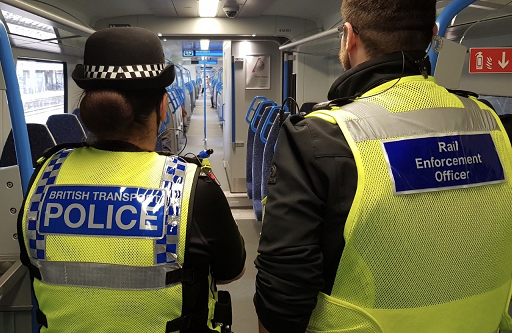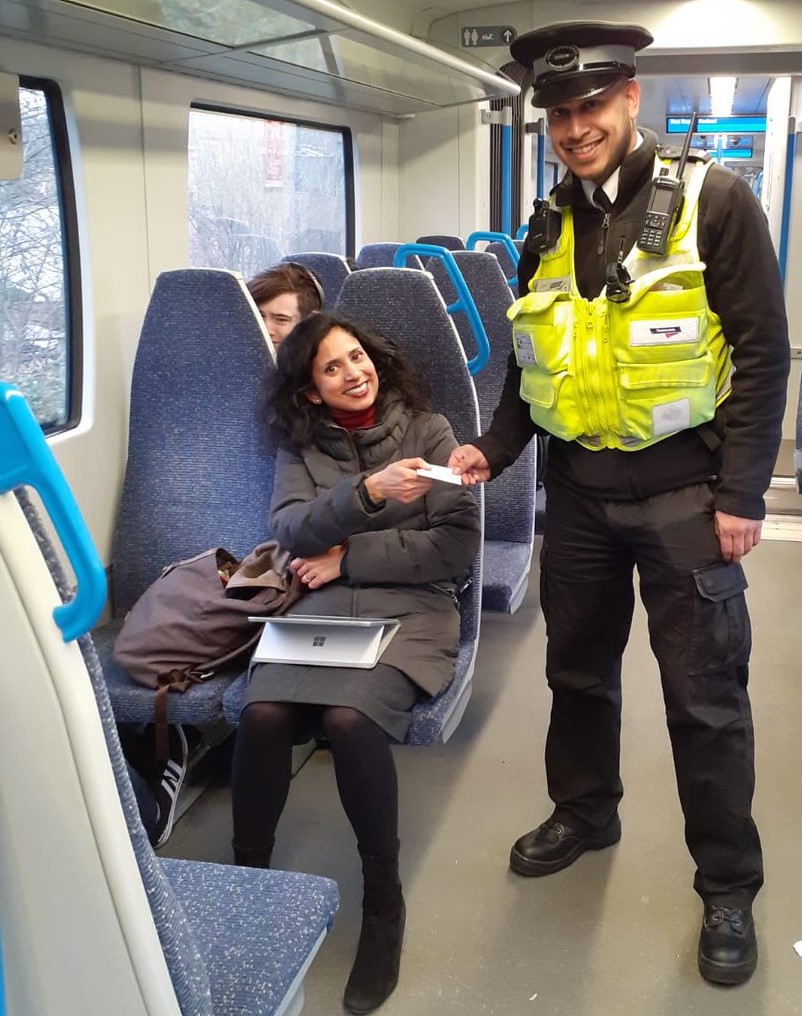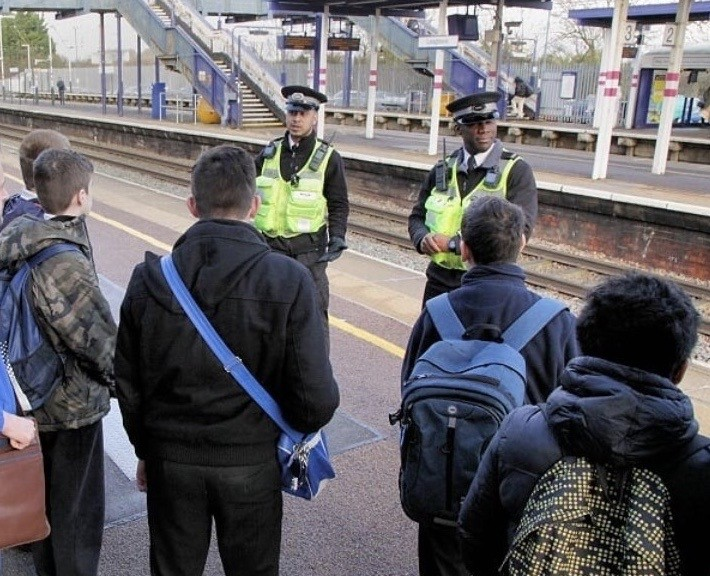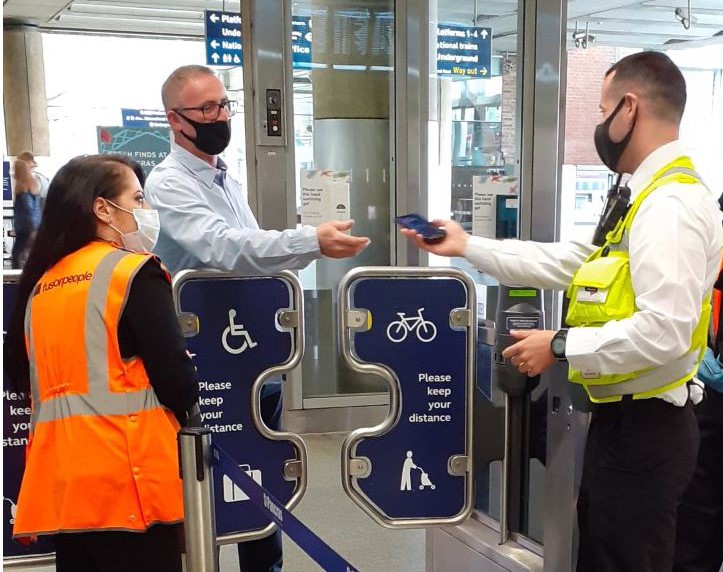Signals at go for police railway safety scheme
Train operator Govia Thameslink Railway (GTR) has a 50-strong, in-house team of Rail Enforcement Officers who work alongside Officers from British Transport Police (BTP) every day to help keep the railway network safe for passengers and staff.
Wearing distinctive uniforms to provide a high visibility and reassuring presence, the Rail Enforcement Officers (REOs) deal with a wide range of low-level crimes and anti-social behaviour including vandalism, graffiti, fare evasion and disruption on crowded trains.
Because of their close relationship with BTP’s front-line officers they are often deployed to cover specific train stations or routes to deter more serious issues that emerge from time to time, such as aggressive loitering or begging, theft, burglary, knife crime, assaults and county-lines drug activities. (Photo below taken pre-COVID-19 lockdown).

By providing a uniformed presence during their day-to-day duties, they are also well-placed to be a beacon of assistance to passengers who are in need of help, such as the homeless or those struggling with mental health issues and those who choose to use the railway as a means to take their own lives.
They also provide an invaluable source of help and support to staff who work on the railway network.
In addition to their front-line role, GTR’s REOs work with BTP to undertake an extensive programme of education and community activities with schools and youth groups to raise awareness of the dangers presented by the railway, such as playing near level crossings and on the tracks. They also run security awareness days at larger rail stations to advise on the importance of security and reporting suspicious activity.
The way they work across their own network and in collaboration with BTP has led to GTR’s REO team winning the Outstanding Teamwork category in the National Rail Awards 2019 – the equivalent of the railway industry’s Oscars.

GTR’s group of companies includes the well-known rail brands Thameslink, Great Northern, Southern and Gatwick Express and has the largest single share of the rail network.
Of the 28 train operating companies across Great Britain, GTR is only one of three companies who have employees accredited with specific but limited police powers by the Chief Constable of British Transport Police under the Railway Safety Accreditation Scheme (RSAS), a voluntary scheme, contained in Section 43 of the Police Reform Act 2002.
The role of assessing companies seeking approval to run a RSAS scheme is carried out by Police Crime Prevention Initiatives (PCPI), a police-owned organisation that works on behalf of the Police Service throughout the UK to deliver a wide range of crime prevention initiatives.
PCPI carries out checks to establish whether companies are ‘fit and proper’ in their standards of management, supervision and accountability to exercise RSAS powers before submitting a report with recommendations to BTP’s Chief Constable, who decides whether to accredit employed people already working in roles that contribute to maintaining and improving community safety with powers under the scheme.
The GTR team of REOs, who are based at Brighton, Purley, Hitchen and London Blackfriars, are all accredited under RSAS by the BTP Chief Constable.
In GTR’s 12-month summary submitted for the National Rail Awards 2019, its REO team was highlighted as having carried out:
- 801 deployments to assist emergency services
- 126 arrests for BTP of individuals wanted for offences including theft, burglary, knives and drugs
- 542 Police National Computer checks for ‘wanted’ or ‘missing’ persons resulting in ‘numerous’ missing persons being returned home safely
- 980 ‘intelligence reports’ for BTP
- 2,248 sanctions for fare evasions
- 141 potential lives saved following the team’s intervention to assist people who had expressed a desire to end their lives. (Photo below taken pre-COVID-19 lockdown).

Over the same period, the REOs joined forces with BTP, and independently, to run specific operations to combat vagrancy, cycle theft and drugs at targeted railway stations and have assisted BTP at regional events. These have included football matches at Brighton and Luton, bonfire celebrations at Lewes, East Sussex, and Alexandra Palace, North London, and the Farr Festival of electronic music, Hertfordshire. Specific achievements have included:
- 14,000 children informed about rail safety
- 100 cycle advice surgeries leading to reductions in cycle crime in those areas
- 14% reduction in cycle crime on the Southern network
- 64% reduction in cycle crime at Redhill Rail station following uniformed patrols and cycle surgeries
- 43.7% reduction in crime at Gatwick Airport station, traditionally a hotspot for theft of passenger property
- 21% reduction in crime at Eastbourne station. (Photo below taken pre-COVID-19 lockdown).

Adam Dear, GTR Rail Enforcement Manager North, explained that having gone through lengthy recruitment and training processes, the REOs spend most of their time in the front-line assisting BTP. “By providing a high visibility, uniformed presence REOs can address certain issues immediately to free-up BTP officers for other priorities whilst increase public reassurance and confidence.
“The team receives specialist training to identify vulnerable persons and by listening to them and understanding their needs, they can help arrange the necessary care and support to keep them safe. Seeing someone on a platform who is clearly vulnerable, or pulling someone back from the edge of the platform who is preparing to jump onto the tracks or in front of a train, is never easy but the work they do to save lives is exceptional.”
Adam’s own team of 22 REOs, who cover Thameslink and Great Northern, helped educate more than 4,600 children about railway safety, even hosting school trips on trains in the area of the Great Northern rail network during 2019.
“The REOs do a great job, sometimes in the most challenging of circumstances, and they make me extremely proud,” he added.
Thameslink and Great Northern Customer Services Director, Jenny Saunders, said: “We are very proud of our RSAS-accredited employees. They all go through a lengthy recruitment process and extensive training, so they are ready and able to work on the front-line every day to keep the railways safe for everyone.
"Passengers gain a lot of confidence and reassurance from seeing staff in uniform who are there to look after them and ensure they have a safe journey and experience on the railway.
"The RSAS-accredited employees also do a lot of work in the community to educate children to be safe around the railway network. They make a huge difference and their work is recognised not only by members of the public but also by officers from British Transport Police.
“Having a recognised police organisation assess us, only provides further endorsement of the quality of the service we are seeking to provide to all our passengers and staff, to keep the railways a safe place for everyone.”

Guy Ferguson, Chief Executive Officer, PCPI, said: “We are really pleased to support policing through this scheme which allows the Chief Constable of BTP to delegate policing powers to properly trained, vetted and accredited staff who can make a significant contribution to safety on the railways. Their involvement allows the release of warranted police officers to do what only they can do.”
PCPI Compliance Manager, Ken Meanwell, who leads on RSAS, said: “The Railway Safety Accreditation Scheme operated by Govia Thameslink is an excellent example of how a train operating company can work with the British Transport Police to reduce crime and increase passenger satisfaction on the railways.”
About RSAS
Any train operating company, business or organisation involved in railway security or safety in the UK can apply for the Railway Safety Accreditation Scheme (RSAS). Companies or organisations seeking to run a scheme are assessed by Police Crime Prevention Initiatives (PCPI) to establish whether they are ‘fit and proper’ in their standards of management, supervision and accountability to exercise RSAS powers. PCPI issues a report with recommendations to BTP’s Chief Constable, who decides whether to accredit employees of those businesses already working in roles that contribute to maintaining and improving community safety with powers under Section 43 of the Police Reform Act 2002. Private security companies seeking to run a RSAS are required to have a contract with a train operator or have future bids/proposals in place. All staff will be vetted before being accredited. PCPI review participating companies every three years. The purpose of RSAS is to achieve a safer and more secure rail network for passengers and rail employees by helping to tackle low level crime, incivilities and anti-social behaviour without involving a police officer as well as improving intelligence and maximising public confidence by providing a high-visibility presence on the railway.
About PCPI
Police Crime Prevention Initiatives (PCPI) is a police-owned organisation that works on behalf of the Police Service throughout the UK to deliver a wide range of crime prevention initiatives to reduce crime and demand on police forces as well as acting as a catalyst to bring together public and private sector organisations to create safer communities.
Further information:
Tel: 0203 8623 999
Email: enquiries@police-cpi.co.uk
https://www.policecpi.com